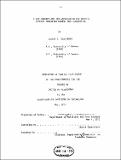| dc.contributor.advisor | Jean Pierre Flatt. | en_US |
| dc.contributor.author | Blackburn, George L., 1936- | en_US |
| dc.contributor.other | Massachusetts Institute of Technology. Dept. of Nutrition and Food Science. | en_US |
| dc.date.accessioned | 2005-09-16T19:46:59Z | |
| dc.date.available | 2005-09-16T19:46:59Z | |
| dc.date.issued | 1973 | en_US |
| dc.identifier.uri | http://hdl.handle.net/1721.1/16531 | |
| dc.description | Thesis (Ph.D.)--Massachusetts Institute of Technology, Dept. of Nutrition and Food Science, 1973. | en_US |
| dc.description | "May 1973." | en_US |
| dc.description | Includes bibliographical references (leaves 118-127). | en_US |
| dc.description.abstract | The preservation of the body cell mass is a major goal of nutritional therapy. Attempts to assure this preservation during acute phases of trauma, burn or sepsis have relied on treatments which appear to maintain the clinical picture of the "fed state" either orally or parenterally ("hyperalimentation"). Recognizing the importance of rapid fat mobilization and the favorable effects of starvation ketosis during periods of severe negative caloric balance, the efficiency of a limited, carbohydrate free alimentation was tested. Based on a metabolic fuel regulatory system that integrates carbohydrate, amino acid and fat metabolism 0.8 to 1.0 g/kg/day of protein was administered orally or intravenously. This regime does not appreciably impede fat mobilization as does comparable intake of carbohydrate. The ingested or infused amino acids need therefore not be expended primarily to support energy production, but can replenish the amino acid pools which sustain protein synthesis. Losses in lean body mass were prevented in obese patients undergoing prolonged periods of acute weight reduction and considerably reduced or even suppress losses in patients supported only by peripheral intravenous infusions. These investigations, hopefully, will provide improvements in nutritional therapies designed at reducing protein catabolism during periods of negative caloric balance. | en_US |
| dc.description.statementofresponsibility | by George L. Blackburn. | en_US |
| dc.format.extent | 149, [4] leaves | en_US |
| dc.format.extent | 8713741 bytes | |
| dc.format.extent | 8713500 bytes | |
| dc.format.mimetype | application/pdf | |
| dc.format.mimetype | application/pdf | |
| dc.language.iso | eng | en_US |
| dc.publisher | Massachusetts Institute of Technology | en_US |
| dc.rights | M.I.T. theses are protected by copyright. They may be viewed from this source for any purpose, but reproduction or distribution in any format is prohibited without written permission. See provided URL for inquiries about permission. | en_US |
| dc.rights.uri | http://dspace.mit.edu/handle/1721.1/7582 | |
| dc.subject | Nutrition and Food Science. | en_US |
| dc.title | A new concept and its application for protein sparing therapies during semi-starvation | en_US |
| dc.type | Thesis | en_US |
| dc.description.degree | Ph.D. | en_US |
| dc.contributor.department | Massachusetts Institute of Technology. Department of Nutrition and Food Science | en_US |
| dc.identifier.oclc | 46477789 | en_US |
